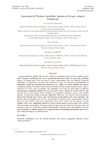Identificador persistente para citar o vincular este elemento:
https://accedacris.ulpgc.es/handle/10553/106712
| Título: | Assessment of various anesthetic agents on Octopus vulgaris Paralarvae | Autores/as: | Escánez, Alejandro Rubio, Jesús Riera, Rodrigo Almansa, Eduardo |
Clasificación UNESCO: | 240119 Zoología marina 251092 Acuicultura marina |
Palabras clave: | Anesthesia Cephalopods Clove oil Ethanol Induction and recovery, et al. |
Fecha de publicación: | 2018 | Publicación seriada: | Journal of the World Aquaculture Society | Resumen: | European Directive 2010/63 addresses the welfare of cephalopod species used in scientic projectsunder European jurisdiction and covers experimental procedures likely to cause pain, suffering,distress, or lasting harm. These procedures require authorization from the National CompetentAuthorities. In aquaculture research, some procedures require the temporary immobilization ofindividuals to allow for measuring body parameters (i.e., weight, sex, gonad condition, and others),avoiding any damage. This study compares three anesthetics used on common octopus, Octopus vulgaris,paralarvae to reach a state of sedation. The anesthetics were tested for their effects at differentconcentrations: magnesium chloride (6.8, 13.6, 20.4, and 27.4 g/L), ethanol (8, 10, and 12 mL/L), andclove oil (0.2, 0.3, and 0.4 g/L). Three variables were monitored: induction, recovery, and stressfulbehavior of paralarvae during treatments. Signicant differences were found between anesthetics,both in the induction and recovery time, and between concentrations of the same anesthetic. Theshortest times of induction and recovery corresponded to ethanol at low concentrations, 10 mL/L(20 ± 1 sec) and 8 mL/L (19 ± 2 sec), respectively. Clove oil at 0.2 g/L was the slowest to reachsedation (340 ± 7 sec). Magnesium chloride at 20.4 g/L showed longer recovery times (554 ± 201 sec)with increasing concentrations. Octopus paralarvae showed adverse behavior only under clove oiltreatments, whose use is therefore considered inadmissible. This study shows that ethanol at 10 mL/Lmay be suitable as a reliable anesthetic for octopus paralarvae, diminishing the induction and recoverytime without showing any stressful behavior. | URI: | https://accedacris.ulpgc.es/handle/10553/106712 | ISSN: | 0893-8849 | DOI: | 10.1111/jwas.12444 | Fuente: | Journal of the World Aquaculture Society [ISSN 0893-8849], v. 49 (6), p. 1019-1025 |
| Colección: | Artículos |
Citas de WEB OF SCIENCETM
Citations
8
actualizado el 11-may-2025
Visitas
109
actualizado el 11-may-2024
Google ScholarTM
Verifica
Altmetric
Comparte
Exporta metadatos
Los elementos en ULPGC accedaCRIS están protegidos por derechos de autor con todos los derechos reservados, a menos que se indique lo contrario.
